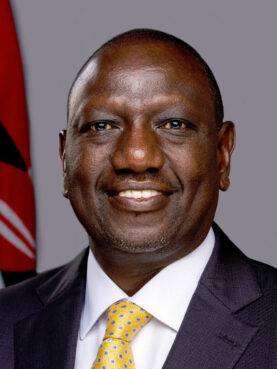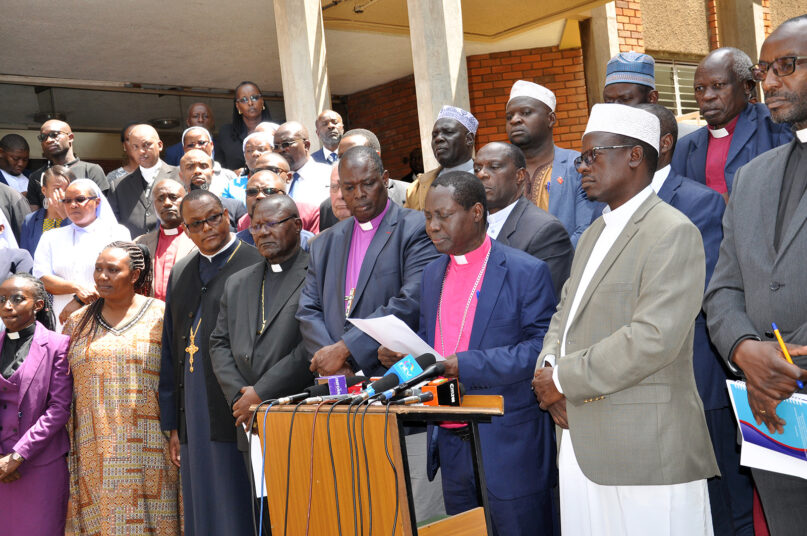
NAIROBI, Kenya (RNS) — Kenya President William Ruto, an evangelical Christian, is known for quoting Bible verses and singing gospel songs in public settings and once wept openly at a church service.
Now Ruto has revealed plans to build a church at the State House, his official residence, at his own expense. The columned building featuring large windows and two rooftop crosses is expected to accommodate 8,000 worshippers, according to an architectural design published in the Daily Nation, one of Kenya’s leading newspapers, and will cost at least 1.2 billion Kenya shillings, or about $9.3 million.
The project has been criticized even by religious leaders in the East African nation.
“The State House is not the president’s property, it’s the people’s property,” the Rev. Joachim Omolo Ouko, an Apostle of Jesus Catholic Priest in the Kisumu Archdiocese, told Religion News Service. “Kenyans are renting him the space and there is no way he can do something on that property without asking for permission from Kenyans.”

Kenyan President William Ruto. (Courtesy photo)
Ouko asked how Ruto was funding the construction of such a large church and why it was necessary to spend so much. “The (Catholic Holy Family) Basilica in Nairobi did not reach one billion shillings,” he said, calling the figure too much for a church.
Anglican Archbishop Jackson Ole Sapit fears a church at the president’s residence would complicate the separation between church and state. “The church is a sanctuary for worship, and it is supposed to be set apart from any unholy use, representing the kingdom of God. When you have a church at the State House, which kingdom does it represent?” Sapit told local media.
Ruto had fired back, saying, “I am not going to seek apologies from anyone for building a church for God. If the devil gets annoyed, let him do whatever he wants.”
He added that his church on the State House grounds is nothing new, pointing to a small church made of corrugated iron, a common building material in the country. “It was made of iron sheets,” Ruto said, “but I have decided to build a church that meets the standards of the State House. This will not cost the government of Kenya a single penny. I will build it with my own money.”
There is precedent for church building by Kenyan leaders. Daniel Arap Moi, who was the country’s longest-serving president, owed his education to the African Inland Mission School and supported the construction of Milimani Africa Inland Church, which stands less than a kilometer from the State House gate.
Kenya’s population is 85% Christian, with Muslims representing 11% and Hindus, Buddhists and followers of African traditional religions making up the rest. The country’s constitution explicitly forbids a state religion.
Sheikh Abdallah Kheir, imam and a consultant on contemporary Muslim affairs, said in a telephone interview, “If we are going to open that door, of constructing places of worship there at the State House, that means when a Muslim enters there he will also construct another house of worship, that means a mosque. I don’t think it’s wise to open that door, because in the future, we may not be able to close it.”
Indeed, some Muslim leaders are asking for the construction of a mosque already in response to Rotu’s church plan. “We, too, raise our voices. The State House is a place that welcomes all faiths and we urge him to consider constructing a mosque for the Muslims, too,” said Sheikh Abu Qatada, the chairperson of the Pwani Patriotic Religious Leaders, a group based in Mombasa.

Kenyan faith leaders during a recent news conference called to speak about the state of the nation, including concerns about the construction of a church at State House. (Photo by Fredrick Nzwili)
Harrison Mumia, president of the Atheists in Kenya Society, wants the process stopped, accusing the president of promoting Christian nationalism.
“We want to remind the President that Kenya does not belong to Christians only,” Mumia said in a statement sent to RNS. “At its core, the construction of a church at State House threatens the principle of the separation of church and state.”
Other African presidents have engaged in controversial religious projects. Ghana’s former president, Nana Akufo-Addo, championed the construction of a cathedral in thanks for his party’s 2016 electoral wins. Addo pledged $400 million, which he said would be privately funded, according to the BBC, but it has so far cost taxpayers $58 million.
In Equatorial Guinea, President Obiang Guema’s Basilica of Immaculate Conception is the second-largest building in Africa and is styled like St. Peter’s Basilica at the Vatican. Guema was criticized for spending on the grand cathedral at the expense of hospitals and schools.
Mobutu Sese Seko, former president of Zaire, now the Democratic Republic of the Congo, constructed the Chapelle de la Miséricorde, a huge worship space, at his private palace in Gbadolite to house the tomb of his wife.
In Algeria, President Abdelaziz Bouteflika started building the Grand Mosque of Algiers in 2012. Inaugurated in 2024, it is described as the largest in Africa, third largest in the world, and has the tallest minaret in the world.
